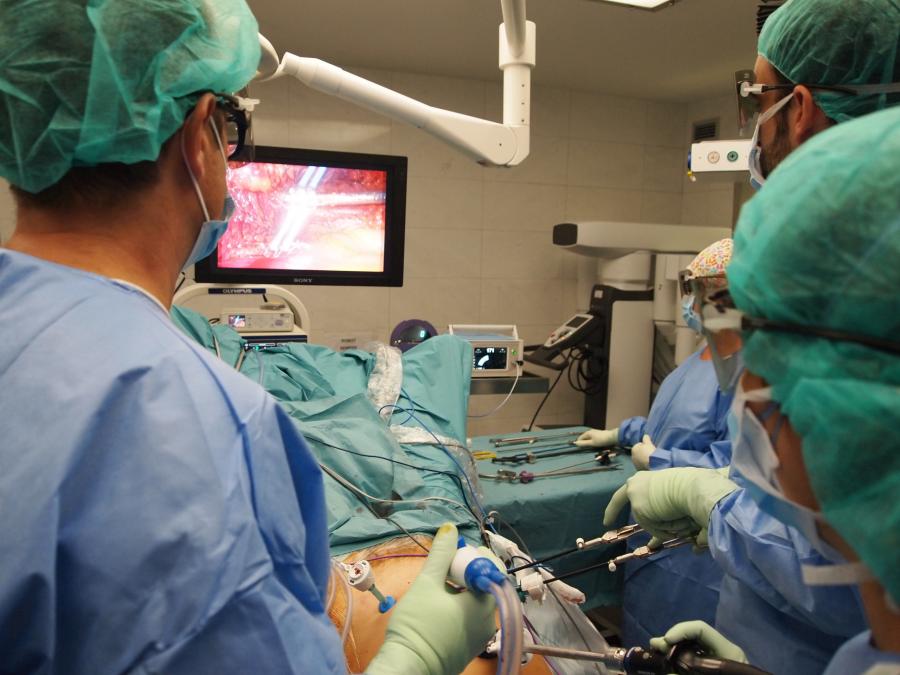
13/05/2021 - Press release

Hospital del Mar-IMIM is leading an international clinical trial to evaluate the performance and suitability of new equipment for locating the sentinel lymph node in prostate cancer patients. The new tool is a flexible, miniaturized probe, which should improve the detection of a marker (a radioactive molecule) injected into the patient to locate the first node the tumour drains to. The technology SENSEI®, has been developed by the UK company Lightpoint Medical with the support of the Hospital del Mar Urology Service.
16/12/2020 - Press release
T-cell acute lymphoblastic leukaemia (T-ALL) is a cancer of the blood that affects mainly children, but also less frequently adults. In adults, although the response to treatment might be initially positive, relapses are common and have a poor prognosis. A collaborative project between IRB Barcelona's Biomedical Genomics lab, headed by ICREA researcher Núria López-Bigas, Anna Bigas' group at the Hospital del Mar Medical Research Institute (IMIM-Hospital del Mar), and Josep Maria Ribera's lab at the Josep Carreras Leukaemia Research Institute (IJC) has discovered that the cells responsible for resistance to T-ALL treatment in adults are already present in the tumours before diagnosis.
29/10/2020 - Press release

The Hospital del Mar Medical Research Institute (IMIM), together with the INCLIVA Health Research Institute, from Hospital Clínic in Valencia, and the Vall d'Hebron Institute of Oncology, have obtained funding from the Spanish Association Against Cancer (AECC) for their project entitled Factors derived from the tumoral microenvironment in localised colon cancer: clinical impact and therapeutic implications. Dr. Clara Montagut, head of the Gastrointestinal Cancer Unit in the Medical Oncology Service at Hospital del Mar, coordinator of the Clinical and Translational Research Group on new therapies and biomarkers in colon and rectal cancer at the Hospital del Mar Medical Research Institute (IMIM) and a participant in the study, points out that "The goal of this research is to identify markers that will help us determine whether the cancer will re-emerge in a patient who has undergone colon cancer surgery. This is extremely important for people who have colon cancer, since at present we are unable to predict whether the tumour will reappear or not after surgery.
19/10/2020 - Press release
Last Friday, the FERO Foundation announced the winners of the 19th FERO Grants and the winner of the 2nd FERO-Mango Breast Cancer Research Project. The grants, worth €80,000 each, are intended to help young researchers develop their translational cancer research projects over a two-year period. "It is expected that 277,394 people will be diagnosed with cancer before the end of 2020. We cannot allow the pandemic scenario in which we find ourselves to detract from the treatment and survival opportunities of the thousands of patients who are currently struggling with cancer. That is why at FERO we are doing everything we can to ensure that COVID-19 affects doctors and patients as little as possible, and that resources continue to reach researchers and centres. One way of achieving this is by continuing to support projects through our grants", explains Sol Daurella, president of the institution.
05/06/2020 - Press release
Detecting the best research talents and providing these people with financial, structural and stability means advancing in cancer care via translational research projects that improve treatment and diagnosis through innovation with clinical application. This is the ambitious goal of the innovative and cutting-edge I CRIS Research Programmes promoted by CRIS against cancer, which have already received their first awards thanks to a meticulous evaluation and selection process led by a prestigious committee of international experts. Over the next five years, the three winning projects will focus on colorectal cancer (the second-ranked cancer in terms of deaths) prostate cancer (diagnosed in 1.3 million people each year), and immunotherapy, a highly innovative type of treatment that is changing the outlook of many cancers. "Research is our life and only through research are we going to find a cure for cancer. With the CRIS Research Programmes we want to detect the best research talent and provide these people with financial and work-related peace of mind. We want to discover and support the Nobel Prize winners of tomorrow and these first CRIS Programmes are just the beginning. In the next edition we will double the number of winners, underlining our commitment to research in spite of the current situation we are experiencing",explains Diego Megía, president of CRIS against cancer.
Més informació "Dr. Clara Montagut, awarded a I CRIS Programme of Excellence in Cancer Research"
12/03/2020 - Press release
Researchers from the Stem Cell and Cancer Group at the Hospital del Mar Institute for Medical Research (IMIM) have led a study in which they have been able to determine the role of two molecules, Dll4 and Notch, and the importance of their relationship in the generation of blood stem cells. This is a very important step in the search to find a viable method for generating this type of cell in the laboratory. The study, which included researchers from the universities of Tel Aviv, Edinburgh, the Sorbonne in Paris, and Cambridge, has been published in The EMBO Journal. The group that led the study is one of the few Spanish teams working in this field, and for years they have been making breakthroughs in their research into blood stem cells and generating these in the laboratory, in the field of regenerative medicine. Right now, "We can make erythrocytes, platelets, a lot of blood products in the lab, but we have never been able to make a cell that has the characteristics of blood stem cells", explains Dr. Anna Bigas, coordinator of the group and first author of the study. Being able to find a method for generating this type of cell in the laboratory would allow patients with diseases like leukaemia, or certain genetic pathologies that affect the blood, and who do not have a compatible donor, to receive a haematopoietic stem cell transplant. In many cases this is the only treatment possible.
Més informació "Key piece in generating blood stem cells in the laboratory discovered"
23/08/2019 - Press release
Researchers from the Molecular Cancer group at the Hospital del Mar Medical Research Institute (IMIM) and doctors from Hospital del Mar, have demonstrated the effectiveness of a drug for treating metastatic bladder cancer in patients who did not respond to the usual treatment. The preliminary results of an ongoing clinical trial show that TAK-228, a mTORC1/2 protein inhibitor, can stop the progression of the disease. Four of the seven patients in the trial showed positive results. The trial also involved Hospital de la Santa Creu i Sant Pau in Barcelona, Hospital Universitari Parc Taulí in Sabadell, Clínica Universitaria in Navarre, and Hospital General Universitario in Elche.
Més informació "Effectiveness of a new bladder cancer treatment demonstrated"
10/07/2019 - Press release
A study led by researchers from the Hospital del Mar Medical Research Institute (IMIM), has determined, for the first time, the importance of a cell mechanism that may be key to treating metastatic tumours. The work has demonstrated the role a protein, kinase IKKα, plays in the ability of tumour cells to repair themselves. This is a key factor in treatment resistance and tumour spread. The research has been published in the journal Molecular Cell. The researchers analysed the role of this protein, activated by mutations of the BRAF and KRAS oncogenes, present in the majority of the most aggressive tumours. The function of this protein is to facilitate DNA-repair in tumour cells after they have been damaged by chemotherapy, making them more resistant to the action of these drugs. This is key for the treatment approach, since this new study demonstrates, conclusively, that combining a BRAF oncogene inhibitor with chemotherapy deactivates and kills the tumour.
Més informació "Mechanism determined for treating the most aggressive tumours"
29/10/2018 - Press release
The study, published in the journal Cancer Research, shows the pivotal role of the enzyme USP27X in the control of the proliferation, invasion and formation of breast cancer metastasis and opens new pathways to the development of anti-tumour drugs. A team of researchers from the Cancer programme of the Hospital del Mar Medical Research Institute (IMIM), led by Drs Victor M. Diaz, of Pompeu Fabra University (UPF) and Antonio García de Herreros, of the IMIM, has identified a key enzyme in cancer development called USP27X.
Més informació "Discovery of a key protein in tumour metastasis"
02/08/2018 - Press release
Inhibiting the Jagged 1 protein in mice prevents the proliferation and growth of colon and rectal tumours. What is more, this approach to the disease permits the removal of existing tumours. This is the conclusion of a study led by the Molecular Mechanisms of Cancer and Stem Cells research group from the Hospital del Mar Medical Research Institute (IMIM), directed by Dr Lluís Espinosa, who is also a member of CIBERONC (the Network Centre for Biomedical Research into Cancer), in collaboration with the Pathological Anatomy and Medical Oncology Units at Hospital del Mar, and the IDIBELL-Catalan Oncology Institute. The work has been published in Nature Communications. The researchers took tumours from patients and then implanted them into mice in order to analyse the role of this protein in cancer cell proliferation. Jagged 1 is essential for cancer cells due to its role in activating the so-called Notch cell-signalling pathway. Generally speaking, Notch inhibits cell differentiation, in other words, a cell's ability to become a mature cell that can no longer proliferate. In the case of colorectal tumours, the activation of this signalling pathway favours their proliferation and growth.
Més informació "Key piece identified for slowing a colorectal cancer subtype"
© Institut Hospital del Mar
d'Investigacions MèdiquesLegal Notice and Privacy Policy | Cookie Policy | Site Index | Accessibility | Find Us | Contact